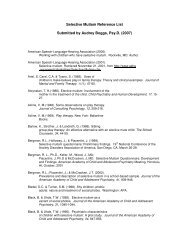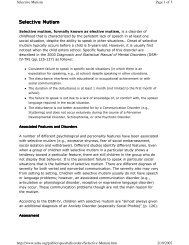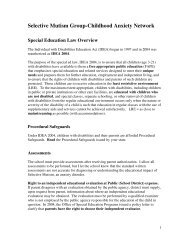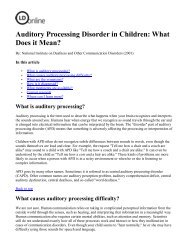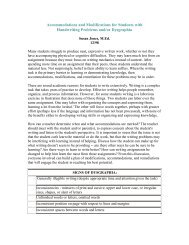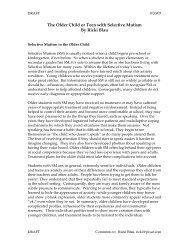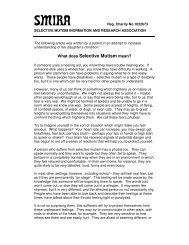IDEA Basics - Selective Mutism Group
IDEA Basics - Selective Mutism Group
IDEA Basics - Selective Mutism Group
- No tags were found...
Create successful ePaper yourself
Turn your PDF publications into a flip-book with our unique Google optimized e-Paper software.
Overview of Basic <strong>IDEA</strong> Issues: ARD Committees, Parents,LRE, IEPs, and Avoiding Due Process HearingsbyJose L. Martín, Attorney at LawCopyright © 1995, 1998, RICHARDS LINDSAY & MARTÍN, L.L.P.The Individuals with Disabilities Education Act (“<strong>IDEA</strong>,” 20 U.S.C. §1400, et seq.) is afederal law passed in 1975 to provide the states with funding to create and developprograms to provide eligible disabled children with a free appropriate public education.With the Congress’ permission, the Department of Education promulgates hundreds offederal regulations that specifically set forth the requirements of the <strong>IDEA</strong>. In addition, thestates pass their own laws, and each state’s board of education promulgates its ownregulations and rules to ensure that the requirements of the act are met in their schools.It’s a big mess, but the basic features of the law can be summarized as follows:1. Individualized Educational Plans (IEPs)What is the IEP?The main aspect of <strong>IDEA</strong> is the requirement that an Individualized EducationalPlans (IEP) be developed for every eligible disabled child. The IEP must contain goals andobjectives individualized for the child, a schedule of services to be provided the child, adescription of the placement where the IEP will be implemented, and a variety of otherstatements and assurances that are set forth in <strong>IDEA</strong>, the Federal regulations, and the TexasCommissioner’s Rules. The IEP is the cornerstone of special education. It is the mostimportant special education document in the eligibility folders.How is the IEP developed?First, the ARD committee determines what goals and objectives the child will beworking on for the next year, and then it determines what placement is necessary for thechild to make progress on those goals and objectives--Placement comes after goals andobjectives. The IEP must be specific, clear, comprehensive, attainable, reasonable,measurable, logical, and complete. The ARD committee’s basic function is to develop theIEP (see below).What is an appropriate IEP?In 1982, the Supreme Court said the IEP must be reasonably calculated to confereducational benefit to the child. Hendrick Hudson Central School District v. Rowley, 458U.S. 176 (1982). That means that the IEP is designed so that the child may reasonably makemeaningful progress on appropriate goals and objectives. In summary, the IEP sets forth,on an individualized basis, what the child will be working on, where he will work, andwhat will be necessary to assist him in his work. The IEP does not have to maximize thechild’s potential or guarantee any particular level of achievement. It must provide a basic“floor of opportunity,” in light of the child’s needs and disabilities.Basic <strong>IDEA</strong> Issues--Page 1
2. Admission, Review, and Dismissal (ARD) CommitteesCongress thought the IEP was too important to be developed by any one person.Thus, <strong>IDEA</strong> regulations require that the IEP be developed by a committee--a multidisciplinaryteam usually composed of teachers, assessment personnel, administrators, andmost importantly, the parent. (See 19 TEX ADMIN. CODE §89.1050).In Texas, we call these teams Admission, Review, and Dismissal (ARD)Committees, because their main functions are to:a. Admit students into the special education process,b. Review their programs (IEPs), andc. Dismiss students who are no longer eligible for special education and relatedservices.ARD committees spend most of their time reviewing, modifying, and fine-tuningstudents’ IEPs. The ARD committees work by consensus, not votes. The committee eitheris in consensus, or it is not. If it is not, usually because a parent disagrees with the IEP, thecommittee must offer the parent an opportunity for a recess of ten days or less, after whichthe committee will meet again to revisit the issues that led to the disagreement. If at thatpoint, the committee cannot reach consensus, the District must proceed withimplementation of its proposed plan, and the parent has a right to seek a due processhearing to contest the District’s IEP.The ARD committee also explains assessment data to the parent, coordinatesdelivery of services, and generally, makes all decisions that significantly affect a disabledchild’s educational program.The ARD committees have the final word on decisions affecting disabled children’seducations. Neither administrators nor the Board of Trustees can legally trump oroverturn ARD committee determinations. Only the ARD committees have legal authorityunder <strong>IDEA</strong> to make these decisions.The committees must meet whenever (1) changes to any part of the IEP areconsidered, (2) major discipline is being considered, (3) new assessment data must bediscussed, (4) the child is transferring to another school within the District, (5) eligibility isin question, (6) the IEP must be developed for the next school year, (7) changes in relatedservices are being considered, (8) changes in the behavior management plan are beingconsidered, or (9) whenever the parent wants to have a meeting.In Texas, parents must be provided five-day written notice of an ARD meeting andthe general reasons for convening the committee. A parent may be asked to waive thefive-day notice if an ARD meeting must be held immediately.Parents can bring anyone they want to an ARD meeting, including attorneys, parentadvocates, interpreters, and friends. If they bring an attorney without first notifying you,you may cancel the meeting and postpone until you are able to contact your own attorneyand secure his or her attendance.Basic <strong>IDEA</strong> Issues--Page 2
3. Parental ParticipationThe <strong>IDEA</strong> envisions a system whereby schools and parents work jointly in theplanning and development of the IEP. Parents are actual consensus members of the IEP,and are considered equal participants in the ARD committee process under the law.Parents usually make their presence known when they exercise the following rights:A. Refuse consent for initial evaluation and/or placementParental consent is required before initial evaluation and initial placement. If aparent refuses to consent to either, the only things the school can do are to try andinformally convince the parent to consent, seek mediation (see below), or request adue process hearing (see below) to get a hearing officer to order the child tested orplaced. If the school has good reasons to test the child or have him placed aftertesting is complete, the hearing officers usually order the parents to consent toevaluation and placement. If a parent does not consent, and the school doesnothing, there may also be legal problems, since schools have a duty to servedisabled kids even if their parents disagree. The law protects kids from unreasonableparents and you should try to do so also.B. Disagree with the rest of the ARD committeeAs stated previously, a parent can disagree with the school members’ decisions. Inthese cases, the parents must be allowed the opportunity for a ten-day (or less)recess, at the end of which the committee must revisit the parties’ disagreement andtry to resolve the dispute. If the dispute cannot be resolved, the District can proceedwith its recommended plan. The parent then can seek other actions, which arediscussed below.C. Request relevant educational recordsUnder the Family Educational Rights and Privacy Act (“FERPA,” 20 U.S.C. 1232g), aparent has a right to access to any of their child’s educational records. Aneducational record is anything that contains information relating to the child.Parents may review records, obtain copies at a reasonable cost, and allow the schoolto disclose records to whoever they want.D. Request an Independent Educational Evaluation (IEE)A federal regulation (34 C.F.R. 300.503) makes it possible for parents to request an IEEwhen they disagree with the results of a District evaluation. If the District wishes todeny the request, it must initiate a due process hearing (see below) to prove that itsevaluation is appropriate. If the District grants the parent’s request, the evaluationmust meet the same criteria that the District applies to its own evaluations (i.e. cost,geographical area, qualifications of evaluator). After the evaluation is complete, theBasic <strong>IDEA</strong> Issues--Page 3
District must consider the results of the evaluation in ARD committee deliberations(although it does not need to necessarily follow the IEE recommendations).E. Seek mediation with TEAThe parent (and the District as well) may ask TEA to involve an impartial, trainedmediator in the dispute. Mediation is completely voluntary; either party maydisagree to mediate their dispute. If the parties agree, a mediator of TEA’s choosingmay contact the parent and perhaps the District to ascertain what issues will bediscussed in mediation. Then, the mediator will go to the District and hold amediation session designed to facilitate the drafting of a mediation agreementsatisfactory to both parties.The role of the mediator is not to determine who is right or wrong, but rather tofacilitate the reaching of an agreement by the parties involved. If either party isdissatisfied with the course of the session, they may choose to end the mediation. If,on the other hand, the parties reach an agreement, they are bound to comply with it.School staff present at the mediation must have authority to bind the District to theprovisions of the mediation agreement.F. File a complaint with the Office for Civil Rights (OCR)Any parent of a disabled child, whether disabled under §504 or <strong>IDEA</strong>, may file acomplaint with OCR alleging a violation of §504. Because all <strong>IDEA</strong>-eligible childrencould also be eligible for services under the broader definitions of §504, OCR can alsoinvestigate violations of §504 in special education programs.OCR addresses all complaints under its new Complaint Resolution Manual, whichemphasizes the reaching of agreements with the school regarding the issues raisedin the parent’s complaint. If efforts at reaching an agreement are unsuccessful, OCRwill send an investigator to the District to conduct an investigation. Theinvestigator will ask for records, and may ask to speak to relevant personnel aboutthe issues raised in the complaint. If OCR finds that the District violated §504, it willtry to negotiate a corrective action plan with the District, outlining the steps thatmust be taken to remedy the violation. If the District refuses to cooperate, OCR hasthe power to terminate a District’s entire federal funding (this has only happenedabout seven times).OCR complaints, even if they do not result in on-site investigations, are timeconsumingand stressful. In addition, once OCR investigates a District, there is atendency toward additional future complaints and investigations.G. Request a due process hearingUltimately, the parent can request that TEA appoint an impartial hearing officer topreside over a due process hearing to make formal rulings regarding the parent’sclaims and allegations. There are currently thirteen special education hearingofficers that hear all due process hearings in Texas. Hearings are fairly formal,Basic <strong>IDEA</strong> Issues--Page 4
with court reporters, trial-like formats, disclosure of evidence rules, expertwitnesses, school witnesses, parent witnesses, and interpreters, if needed. Somehearings can take five or more days to complete.The hearing officer has the power to order a District to change an IEP, pay forresidential placement, pay for an independent evaluation, provide certain services,or provide compensatory education as a penalty for the failure to provide necessaryservices for a period of time. The hearing officer can find an IEP or evaluation to beinappropriate, and can review any action of the ARD committee with respect to theidentification, evaluation, or placement of <strong>IDEA</strong>-eligible children.Because the process is rather formal, and because the stakes can be quite high, dueprocess hearings usually involve attorneys on both sides. If a school district loses onany significant issue in the due process hearing, the district must pay the opposingattorney’s fees, which can run as high as $80,000.00. Few of the insurancecompanies currently in the business of insuring school districts in Texas providecoverage for the defense of these hearings or any potential attorney’s fees liability.These losses must come out of local funds. Of course, the cost of defending a dueprocess hearing can also be quite high, since attorneys must evaluate and preparethe case and witnesses carefully prior to the hearing.If a parent loses on any issue raised in the hearing, they may appeal the decision tothe nearest federal district court. These actions are generally covered by insurance.4. Least Restrictive Environment<strong>IDEA</strong> mandates that whenever possible, disabled children should be educated in theregular classrooms. If not possible, then they must be educated in the setting that providesthe maximum opportunities for interaction with non-disabled peers. This is called the<strong>IDEA</strong>’s Least Restrictive Environment (LRE) mandate, and it has received tremendousattention in the past few years. The attention is due to a growing perception among manyeducational experts that pull-out special programs, and segregated settings, do notadequately prepare disabled children for their post-school experiences. Recent federal courtcases have reflected this emerging philosophy, and inclusion advocacy, headed by groupssuch as Advocacy, Inc. and ARC-Texas, has become increasingly aggressive and litigious.The best avenue to prevent LRE litigation is to allow disabled children, no matterhow disabled, at least a chance in the regular classroom before concluding that the childcannot be served there. Inclusion is not about “dumping” kids in regular classes; it is aboutproviding the support services to both teacher and student that may be necessary for thechild to succeed in the regular classroom, including aides, team teachers, modifications,behavior plans, assistive technology, peer tutors, etc. Although some of inclusion thinkingis debatable, one issue is clear: there are too many children in resource and self-containedclasses that could be served in regular classes with some effort, training, and planning.The trend towards more inclusive programming is creating increased emphasis onmodifications in the regular classroom setting. Regular teachers are being asked to be moreBasic <strong>IDEA</strong> Issues--Page 5
creative, efficient, and consistent in implementing modifications that will allow forsuccessful placement in regular classes.5. Avoiding due process hearingsSometimes, hearings cannot be avoided. But generally, the following factors areessential in reducing the risk of litigation in the special education context:a. Respect parental rights, especially their right to participate fully in thedevelopment of the IEP;b. Keep lines of communication open;c. Address and investigate issues of parental concern promptly;d. Address children’s problems in the classroom promptly;e. Return parents’ phone calls;f. Be very careful with discipline issues;g. Always pay attention to legal compliance issues;h. Get consultation on legal issues before making tough decisions;i. Do not rely on old practice and policy that does not comply with the law;j. Develop good IEPs, and implement them to the letter;k. Coordinate delivery of services effectively;l. Follow required ARD procedures;m. Develop behavior management plans for recurring behavior problems in anydisabled child;n. Get ample consultation in developing programs for autistic kids;o. Use cost-benefit analysis in choosing what issues to make a stand on.Basic <strong>IDEA</strong> Issues--Page 6



